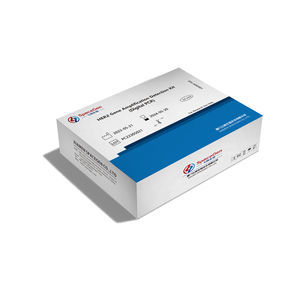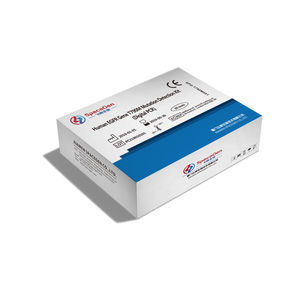

- Company
- Products
- Catalogs
- News & Trends
- Exhibitions
Gene MET detection kit PC22306014for researchfor lung canceroncology
Add to favorites
Compare this product
Characteristics
- Applications
- for research, for lung cancer
- Application field
- oncology
- Tested parameter
- EGFR, gene MET
- Sample type
- laboratory, cell
- Analysis mode
- for PCR
Description
Non-small cell lung cancer (NSCLC) patients with EGFR mutations can achieve good therapeutic effects by using epidermal growth factor receptor (EGFR) tyrosine kinase inhibitors (TKIs) such as gefitinib, erlotinib, and osimertinib. However, primary/acquired resistance to EGFR-TKIs, such as gefitinib, erlotinib, and osimertinib, cannot be avoided. Among them, MET amplification is one of the causes of resistance to EGFR-TKIs, accounting for about 5% of the resistance reasons.
GENE INTRODUCTION
MET is an oncogene and one of the driver genes in various cancers. MET amplification activates the ERBB3 (HER3)-dependent activation of the PI3K pathway, which is specific to the EGFR/ERBB receptor family. The ultimate result is the promotion of cell transformation, cell invasion, cell proliferation, and cell cycle progression, among other effects. MET amplification can coexist with other oncogenic drivers, such as EGFR, ALK, and KRAS.
DETECTION SIGNIFICANCE
Before initiating treatment for NSCLC patients, detecting MET amplification helps match patients with appropriate targeted drugs based on genetic mutation information. This improves the specificity and effectiveness of treatment, ultimately achieving personalized therapy.
FEATURES & ADVANTAGES
1. High sensitivity: Can detect mutations with DNA sample content as low as 0.1%.
2. Accurate quantification: Quantitatively detects gene copy number variations, enabling timely detection of disease progression and adjustment of treatment plans.
3. No need for internal controls: Avoids false-negative results.
4. Simple and fast: Testing can be completed within one working day in the hospital/laboratory setting.
Catalogs
No catalogs are available for this product.
See all of SPACEGEN‘s catalogsRelated Searches
- Assay kit
- Blood assay kit
- Immunoassay assay kit
- Plasma assay kit
- Infectious disease detection kit
- Analysis software
- Molecular test kit
- Respiratory infection test kit
- Whole blood detection kit
- Optical assay kit
- Clinical assay kit
- Fluorescence assay kit
- Viewer software
- Real-time PCR test kit
- Research assay kit
- Laboratory software
- Windows software
- Laboratory detection kit
- Cell assay kit
- Oncology test kit
*Prices are pre-tax. They exclude delivery charges and customs duties and do not include additional charges for installation or activation options. Prices are indicative only and may vary by country, with changes to the cost of raw materials and exchange rates.


